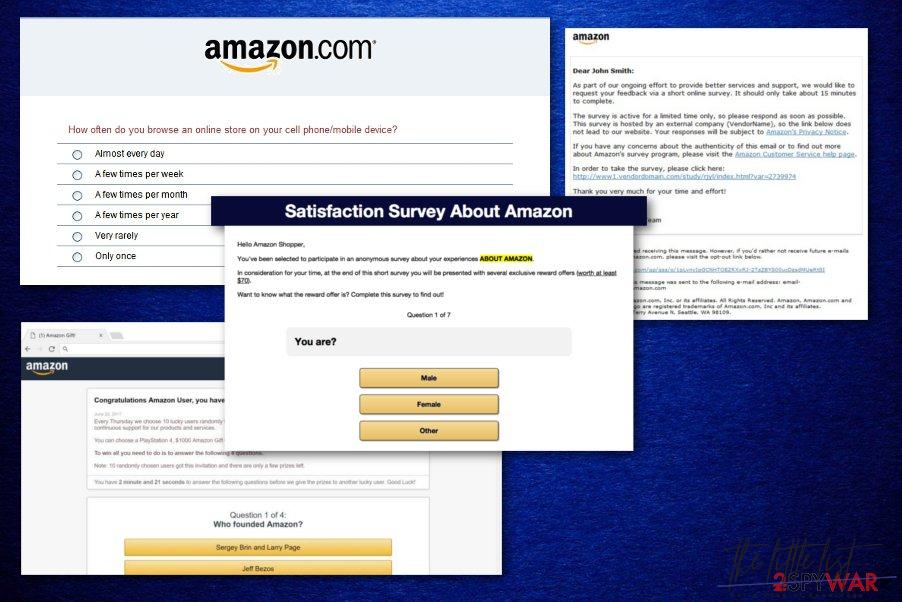How do I know if an Amazon email is real?
Check the return address: Genuine emails from Amazon always will come from an address ending in “@amazon.com” or the email addresses listed here: amazon.co.uk. amazon.de. amazon.es.
Then, Does Amazon have a shopper survey?
The Amazon Shopper Panel is an opt-in, invitation-only program where participants can earn monthly rewards by sharing receipts from purchases made outside of Amazon.com and by completing short surveys. Earning rewards is easy.
Where do I send fake Amazon emails?
If you wish to report a suspicious email claiming to be from Amazon that you believe is a forgery, you may submit a report. You may also forward phishing emails and other suspected forgeries directly to stop-spoofing@amazon.com.
Does Amazon send emails about orders?
Steps to take if you receive an email from Amazon
If you received an email about an Amazon order, open Amazon’s website directly through your browser, log in to your account, and look under “Your Orders” to see if any orders match the details in the email.
What is an example of a phishing email?
An email from PayPal arrives telling the victim that their account has been compromised and will be deactivated unless they confirm their credit card details. The link in the phishing email takes the victim to a fake PayPal website and the stolen credit card information is used to commit further crimes.
How do I report suspicious email?
If you got a phishing email, forward it to the Anti-Phishing Working Group at reportphishing@apwg.org . If you got a phishing text message, forward it to SPAM (7726). Step 2. Report the phishing attack to the FTC at ReportFraud.ftc.gov.
What happens if you open a phishing email?
Clicking on a phishing link or opening an attachment in one of these messages may install malware, like viruses, spyware or ransomware, on your device. This is all happens behind the scenes, so it is undetectable to the average user.
How do you know if your phished?
Look for: Suspicious messages, emails and social posts containing shortened links. Web pages that ask for login credentials. Suspicious emails with uncharacteristic language.
What are 4 common indications that an email is a phishing attempt?
What are common indicators of phishing attempts?
- Suspicious sender’s address. The sender’s address may imitate a legitimate business.
- Generic greetings and signature.
- Spoofed hyperlinks and websites.
- Spelling and layout.
- Suspicious attachments.
What can a scammer do with my email address?
What Can a Scammer Do With My Email Address?
- They Can Impersonate You.
- They Can Crack the Passwords on Your Other Accounts.
- They Can Use It to Crack Email-Based Two-Factor Authentication (2FA)
- They Can Collect Sensitive Information.
- They Can Steal Your Identity.
- They Can Learn When You’re Out.
How can you identify a scammer?
Four Signs That It’s a Scam
- Scammers PRETEND to be from an organization you know. Scammers often pretend to be contacting you on behalf of the government.
- Scammers say there’s a PROBLEM or a PRIZE.
- Scammers PRESSURE you to act immediately.
- Scammers tell you to PAY in a specific way.
Is it safe to forward a phishing email?
Remember to NEVER open any attachments that are within a suspected spam or phishing email, as they could contain malware. Click on the email you wish to forward as an attachment. On the Home tab, in Respond group, click the down arrow by More, and select Forward as Attachment.
Can you be hacked by just opening an email?
No, you can’t get hacked by simply opening an email. This was possible before when emails would run JavaScript in the preview pane allowing malware to spread without any action from the user.
What if I clicked on a phishing link but did not enter details?
Ignore any messages asking to connect to the internet. If you don’t have an anti-virus program, we recommend installing Malwarebytes. If the anti-virus scan identifies any threats, it will ask if you want to remove or quarantine the threats, in which case you say Yes or Continue.
What if I accidentally clicked on a suspicious link?
The first thing you need to do if you clicked on a phishing link is immediately disconnect your device from the internet. This prevents malware from spreading to other devices connected to your network. If you’re using a wired connection, then simply unplug it from your computer or laptop.
How do I know if an email is real?
How to tell if an email is real: Look at the sender’s email address, the content of the message (grammar, spelling, punctuation, etc.). and check the domains of any embedded links to see if they direct to you the company’s legitimate website.
What are the 2 most common types of phishing attacks?
The 5 most common types of phishing attack
- Email phishing. Most phishing attacks are sent by email.
- Spear phishing. There are two other, more sophisticated, types of phishing involving email.
- Whaling. Whaling attacks are even more targeted, taking aim at senior executives.
- Smishing and vishing.
- Angler phishing.
Can someone hack your bank account with your email address?
Your email also may contain a wealth of information about your bank account, credit cards, and other financial accounts. A hacked email can put you and your email contacts at risk for identity theft and bank account or credit card fraud.
Can someone hack you by knowing your email address?
If a hacker wanted to try breaking into one of your online accounts, knowing your email address is a solid first step. Obviously, they can’t log in without your password, but by knowing your email address, they could target you with phishing emails – malicious attachments that install malware on your machine.
Should I delete my email if it was hacked?
If you have been hacked several times and your email provider isn’t mitigating the amount of spam you are receiving, then consider starting afresh but don’t delete your email address! Many experts do warn against deleting email accounts as most email providers will recycle your old email address.
How do scammer know your name?
Spammers often release information-gathering programs called “bots” to collect the names and e-mail addresses of people who post to specific newsgroups. Bots can get this information from both recent and old posts.
What information does a scammer need?
Much like a Social Security number, a thief only needs your name and credit card number to go on a spending spree. Many merchants, particularly online, also ask for your credit card expiration date and security code. But not all do, which opens an opportunity for the thief.
How can you identify and avoid being scammed?
Protect yourself
- Be alert to the fact that scams exist.
- Know who you’re dealing with.
- Do not open suspicious texts, pop-up windows or click on links or attachments in emails – delete them: If unsure, verify the identity of the contact through an independent source such as a phone book or online search.
What happens if I open a phishing email?
Clicking on a phishing link or opening an attachment in one of these messages may install malware, like viruses, spyware or ransomware, on your device. This is all happens behind the scenes, so it is undetectable to the average user.
What happens if I open a phishing email on my Iphone?
If you opened a phishing email, clicked on a link, and took action by entering your financial details or login credentials: Hackers often send phishing emails disguised as emails from banks or other companies requiring you to verify your financial information.
What should you not do if you think the email you received is a phishing attempt?
If you suspect that an email or text message you received is a phishing attempt:
- Do not open it.
- Delete it immediately to prevent yourself from accidentally opening the message in the future.
- Do not download any attachments accompanying the message.
- Never click links that appear in the message.
Can someone hack my bank account with my email address?
Your email also may contain a wealth of information about your bank account, credit cards, and other financial accounts. A hacked email can put you and your email contacts at risk for identity theft and bank account or credit card fraud.
What can a hacker do with your email address?
If hackers gain access to your email, they could have an open doorway to any number of other devices and accounts. They can use your email to reset other account passwords, gain access to credit information, or even delete accounts, such as social media profiles.




